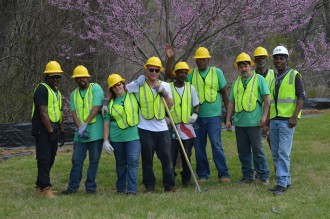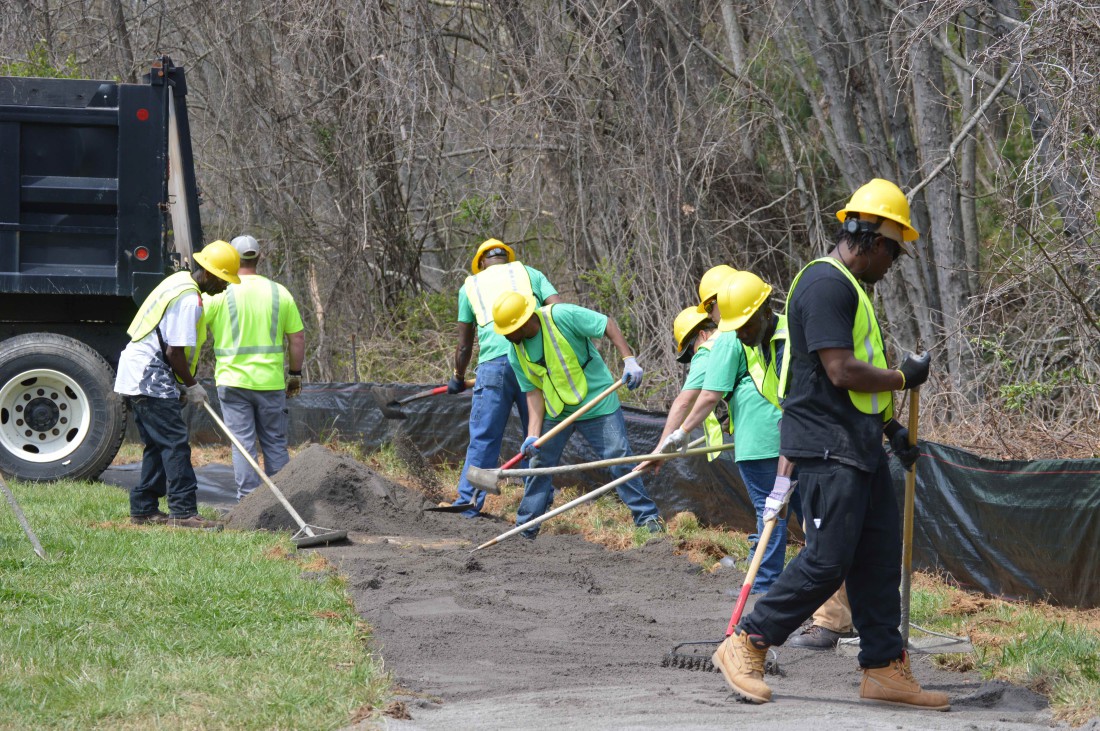Asheville’s greenway system is very much a work in progress. Established routes such as the French Broad River Greenway await their links to future projects, some still on the drawing board and others shovel-ready but yet to be funded. The city is searching for millions of dollars in funding to complete the River to Ridge Greenway and Trail Network, over 10 miles of connected paths that would provide access from downtown to the French Broad River and Blue Ridge Mountains.
But even a work in progress can still yield dividends. For the 10 students in the Green Opportunities Greenway Construction Training program, greenway construction is already providing hope for a route out of poverty. The job-training nonprofit teamed up with the city of Asheville to construct a temporary trail on the planned Town Branch Greenway, which opened to the public after a ribbon-cutting ceremony on April 27.
J Hackett, executive director of Green Opportunities, explains that he didn’t have to look far for the partnership: The finished Town Branch Greenway would run directly behind the organization’s office in the Southside neighborhood. He reached out to Lucy Crown, the city’s greenway coordinator, with the idea for a collaboration that would contribute to the greenway, and together they identified a 1,000-foot stretch of planned path behind the nearby Dr. Wesley Grant Sr. Southside Center.
Funded by a $10,000 grant from Mountain Area Workforce Development, a $5,000 grant from New Belgium Brewing Co. and $2,400 from the city Transportation Department, the project established a 6-foot-wide trail surfaced with fine gravel. The trail will serve pedestrians and cyclists until its planned removal in 2020 to make way for the greenway’s permanent path. That construction hangs on the city’s ability to find additional money; last year, City Council cut the Town Branch Greenway from its funding package for the River Arts District Transportation Improvement Project.
The project marked Green Opportunities’ first foray into building greenways, but the work was a natural extension of the organization’s construction training efforts, which have graduated 16 classes over 10 years. These free classes prepare students — all of whom must earn less than 80 percent of the area median income to enroll — for careers that can change the trajectories of their lives. “The construction industry is extremely forgiving,” says Hackett. “It works with people who are walking down the path to their future.”

That description applies to student Keith Hendershot. “I came to this program as a recently homeless person who has substance abuse issues, and I was recommended by the Justice Resource Center after a DUI,” he says. “I’ve always wanted to learn carpentry and the trades, but where I grew up in Tennessee, no one actually sat down and taught me how to do things. Everything I’ve done with GO has been really just little miracles.”
“[The program] is an opportunity, especially for people with backgrounds in their earlier life,” adds student William Raines. “Green Opportunities overlooks that past, and that’s a big help, because sometimes that can be a stumbling block for people.”
Raines and other participants in the eight-week program split their time between classroom instruction and work at the greenway site. While city staff handled the heavy machinery, the Green Opportunities crew performed hands-on duties such as invasive plant removal, spreading gravel and building trail amenities like picnic tables and benches.
Crown says she was impressed by the initiative she saw in her interactions with the Green Opportunities class. “I thought [the students] were very eager to help, and they had a great attitude,” she recalls. “I sat in on a number of the classes where guest speakers came in to talk about different aspects of maintenance and trail building, and they asked great questions.”
The students may eventually join Crown on a more regular basis. Graduates of the program are guaranteed an interview with the city of Asheville for suitable job openings, and Hackett suggests that Green Opportunities itself might bid as a subcontractor on future greenway work once it develops a sufficiently strong workforce.
While that particular work is contingent on funding for the greenways, graduates of the Green Opportunities program are confident they can put their newly developed skills to use. “We’ve all been through different things in our lives. Being here in this program, I’ve learned there’s nothing that can get in the way,” says student Lamont Eddings. “You can do better for yourself.”




Before you comment
The comments section is here to provide a platform for civil dialogue on the issues we face together as a local community. Xpress is committed to offering this platform for all voices, but when the tone of the discussion gets nasty or strays off topic, we believe many people choose not to participate. Xpress editors are determined to moderate comments to ensure a constructive interchange is maintained. All comments judged not to be in keeping with the spirit of civil discourse will be removed and repeat violators will be banned. See here for our terms of service. Thank you for being part of this effort to promote respectful discussion.